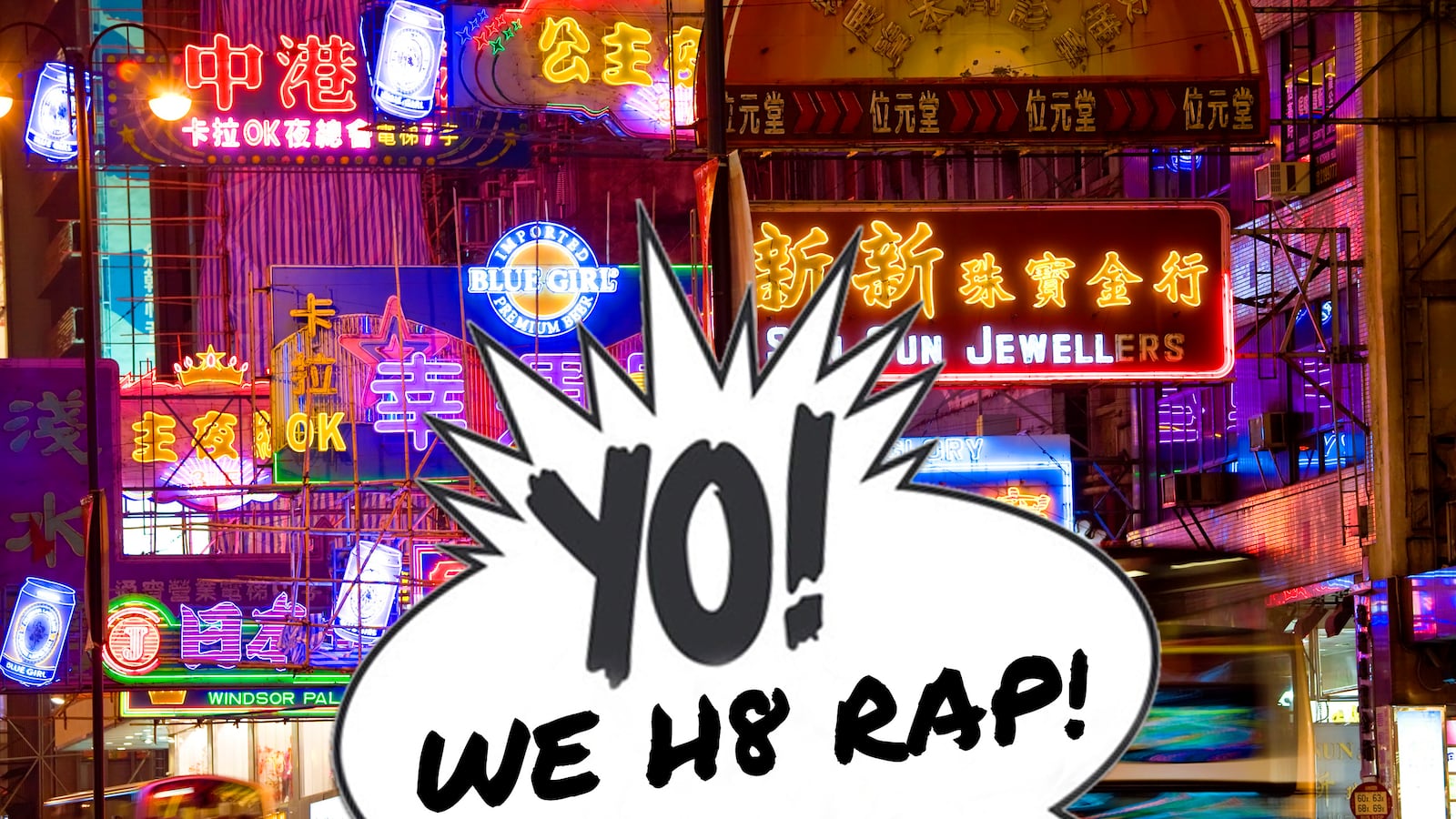MastaMic, a Cantonese rapper in Hong Kong, is hyped up. He’s halfway through a vibrant, fast-paced set in the city’s effervescent Wan Chai district. With a style that mirrors 2 Chainz or Twista, he spits out a song sampling Justice’s D.A.N.C.E. Then he starts a call-and-repeat with his audience.

“Say ‘hell, yeah!’” he cries out.
“Hell, yeah,” they respond hesitantly.
“Say ‘fuck, yeah!'” he presses.
The audience notably tenses up. Only a smattering of voices respond.
“It’s just not proper to say,” a listener later explains, regarding the prudish crowd.
MastaMic’s most popular rap songs show up on YouTube with viewership in the six digits. He is a gifted lyricist, but in the Hong Kong live music scene, rap is a niche genre. His set, two weeks ago at a venue sponsored by a popular karaoke chain, comes after a local pop boy-band’s performance.
With a showing of hands, only about six in the crowd have heard his music before.
“Nobody cares about hip-hop here. Everybody cares about Canto-pop,” he told The Daily Beast, referring by nickname to the dominant Cantonese pop genre. He points to cultural tastes left behind by British colonialism as a contributing factor to hip-hop’s marginalization in mainstream tastes.
“This is a historical problem. Hong Kong is a British colony, so really got influenced by European culture. That’s why rock and roll is so popular here,” MastaMic said. “Hip-hop is a fusion of different genres like jazz, soul, funk. We don’t have jazz, soul, funk here—people here are not feeling the vibe. They don’t know how to groove.”
Wing Ho, a Kowloon resident, says she enjoys Rihanna but has never heard of Drake, and prefers the sounds of Bruno Mars to local Hong Kong rappers.
“Rap is just not my cup of tea. It’s too aggressive,” she said.
Cantonese hip-hop aficionados attest that Hong Kong’s traditional culture meshes poorly with hip-hop’s traditional gangster image, its aggressive beats and refined lyrical flow.
“There’s no thugging out in Hong Kong, no ‘bang, bang, Imma shoot you in the face,’ there’s no ‘bling bling’ in Hong Kong. Low-riders? There are no low-riders in Hong Kong,” quips JBS, a rapper with 24Herbs, a crew named after a bitter herbal tea popular in the former British colony. “Hong Kong music is based on karaoke music, meaning simple beats, simple lyrics, enjoyable.”
The greatest challenge to hip-hop’s broader expansion is probably a market-based one—hip-hop doesn’t fit with Hong Kong’s karaoke culture.
“The music industry is changing. People aren’t buying CDs. Going through the karaoke companies is basically the new business model,” explains Raffi Kamalian, the CEO of AliveNotDead, an online community for indie music acts in Asia. “You sell your exclusive rights to one of these karaoke chains, and they’ll help produce [the music]. That sort of forces the industry into karaoke-friendly songs more and more.”
The demographics of Cantonese—a dialect of Chinese that is spoken by relatively few people but punches above its weight as a global language due to its status as an official language in the financial center of Hong Kong—also creates marketing challenges.
MC Jin, a Chinese-American rapper who rose to prominence in the U.S. on BET’s 106 & Park freestyle competitions and lived in Hong Kong between 2008 and 2012, said Hong Kong’s relatively small population of 7.2 million was stunting hip-hop’s potential. There are only four or five serious hip-hop groups in the region, and perhaps three more solo acts.
“It’s such a small demographic, I think that’s the biggest challenge for it becoming dominant. America is a vast land… I can potentially build a fan base throughout the whole 50 states,” said the rapper, who moved back to New York City after the birth of his son in 2012. “Hong Kong is really small geographically… the reality is that it’s hard for anything to [become] dominant in a sense unless it’s what they’re traditionally known for already, because it’s so small.”
Asked if Hong Kong’s hip-hop scene has growth potential, MC Jin responds, “Nothing is impossible.” From a cultural perspective, hip-hop in Hong Kong would continue to grow and evolve, he said, but its commercial prospects were grim.
Cantonese as a language also poses challenges for rap. With nine tones, each sound pronounced in a different intonation changes its meaning. Saying a word in a different tone can distort or utterly mangle a line.
Cantonese, with its individual characters, also forces rappers to adopt a staccato lyricism.
“You can’t just go with the flow,” said JBS. “In English, you can go with the flow.”
Homer Lee, a musician with the Hong Kong cover band M for Music, said that English songs tend to do well locally, but that slower songs are preferred so that the lyrics can be understood by those who view English as a second language.
“Most of the hip-hop in the world is in English, so people say, ‘Oh, it’s too fast, I don’t understand it,’ R&B, and pop with a slower beat, is much more popular here,” Lee said.
As he was speaking, M for Music was busking illegally at the Star Ferry Pier in Tsim Sha Tsui, a major transit point that connects Hong Kong Island with Kowloon.
Risking a $1,500 HKD fine, nearly $200 USD, their cover of the moment was a moody song by Coldplay.





